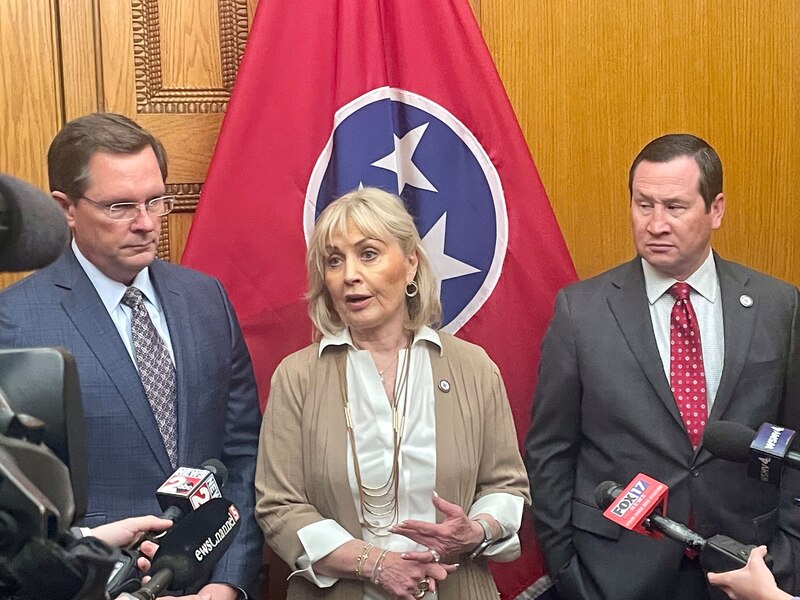Join Chalkbeat Tennessee’s free every day publication to maintain up with statewide training coverage and Memphis-Shelby County Faculties.
Tennessee lawmakers accredited a state price range Thursday that features $144 million to create a statewide faculty voucher program that Republican leaders say they’re nonetheless working to move.
The cash is in place in case the GOP-controlled Home and Senate discover a option to reconcile vastly completely different proposals for the voucher program, which would offer taxpayer funding towards non-public faculty tuition for as much as 20,000 college students. The common voucher invoice, referred to as the Schooling Freedom Scholarship Act, is Republican Gov. Invoice Lee’s high training precedence.
However as lawmakers intention to wrap up their 2024 session by subsequent week, the passage of the price range limits choices for negotiators looking for to persuade Home members to compromise on their extra expansive — and costly — voucher invoice.
To persuade largely rural representatives who’re hesitant about taking funding away from their native faculty districts for personal faculty vouchers, the Home measure additionally seeks to provide public faculties $75 per pupil for constructing building and upkeep, in addition to cash to extend the state’s contribution towards academics’ medical insurance coverage protection from 45% to 60%, amongst different enticements for public faculty supporters.
Voucher payments caught in finance committees
In the meantime, the dueling voucher payments languished in finance committees for a fourth straight week with out motion, making the proposal’s probabilities for passage more and more dim.
Nonetheless, Lt. Gov. Randy McNally mentioned it was “untimely” to declare the invoice useless, as a number of information experiences have accomplished.
Till the legislature adjourns, “it’s nonetheless alive,” he advised reporters.
McNally mentioned the Senate is poised to approve its voucher invoice, which in contrast to the Home’s model requires recipients to take some kind of annual check to indicate their educational progress. The measure, which is sponsored by Majority Chief Jack Johnson and has 17 Senate co-sponsors, additionally requires open enrollment throughout public faculty programs.
Home Speaker Cameron Sexton, whose chamber is extra divided over the voucher plan, was reserved in his enthusiasm however pledged to maintain engaged on a deal.
“On the finish of the day, it’s an administration invoice,” Sexton advised reporters. “Till (Gov. Lee) tells us to cease negotiating and dealing with the Senate, then we’re going to proceed to try this.”
Democratic lawmakers have been united of their opposition to both invoice — and are staying vigilant because the legislative session enters its remaining week.
“I’ve seen laws move at 2 within the morning that we thought was useless for the 12 months,” mentioned Senate Minority Chief Raumesh Akbari of Memphis, who has served within the Basic Meeting since 2013.
“Something can occur; something has occurred,” she added.
Base trainer pay will rise
State revenues are down, one-time federal COVID reduction funding is working out, and cash is tighter this 12 months after years of price range surpluses.
In opposition to that backdrop, the Home and Senate voted alongside largely partisan strains to approve a virtually $53 billion state authorities price range for the fiscal 12 months that begins July 1.
The spending plan injects an additional $261 million within the state’s Ok-12 training system, virtually half of which is able to go towards elevating the annual minimal wage for public faculty academics from $42,000 to $44,500.
“It retains us on monitor to deliver our base wage for our academics to $50,000 a 12 months by fiscal 12 months ‘26-’27,” mentioned Home Finance Committee Chairperson Patsy Hazlewood, a Republican from Sign Mountain.
Nashville Democrats tried so as to add quite a few price range amendments in each the Home and Senate.
Rep. Aftyn Behn and Sen. Heidi Campbell sought to double the variety of seats within the state’s pre-kindergarten program by reallocating the $144 million in voucher cash. Rep. Bo Mitchell proposed scuttling $15 million in non-recurring funds put aside to assist public constitution faculty operators pay for varsity services and upkeep. And Rep. John Ray Clemmons proposed eliminating the Tennessee Public Constitution Faculty Fee and investing its funding as a substitute within the state’s Ok-12 training funding components.
The amendments have been simply defeated.
Democrats additionally criticized a measure that features as much as $1.95 billion in tax breaks and refunds for companies, however little tax reduction for working households or new investments for impoverished Tennesseans.
“Due to the refusal of this physique and our authorities to handle poverty to assist the poor and the marginalized, we’re persevering with to take care of a deficit, not solely financially however morally on this establishment,” mentioned Rep. Justin Pearson, a Memphis Democrat who voted in opposition to the price range.
Hazlewood, the Home finance chairperson, countered that the state’s poverty fee has gone down over the previous decade. She characterised Tennessee as a “middle-class household” that has to spend its {dollars} rigorously and is prioritizing applications that profit training, households, security, well being, and social providers.

Peppered with questions on what would occur to the $144 million for vouchers if the brand new program isn’t accredited, she mentioned the cash can’t be reallocated with out the legislature’s approval.
“If there’s no payments (accredited) that deal with that, any monies unspent stay within the price range. We might have these different monies once we come again in subsequent 12 months,” Hazlewood mentioned, including that the voucher funds can also’t be spent by the governor by means of an govt order.
Tennessee already has a number of smaller voucher initiatives. A program for college students with disabilities launched in 2017, and the state training division rolled out a focused pilot program for low-income college students in Davidson and Shelby counties within the fall of 2022. It has since added Hamilton County and has 2,095 college students enrolled in all three counties.
Marta Aldrich is a senior correspondent and covers the statehouse for Chalkbeat Tennessee. Contact her at maldrich@chalkbeat.org.

